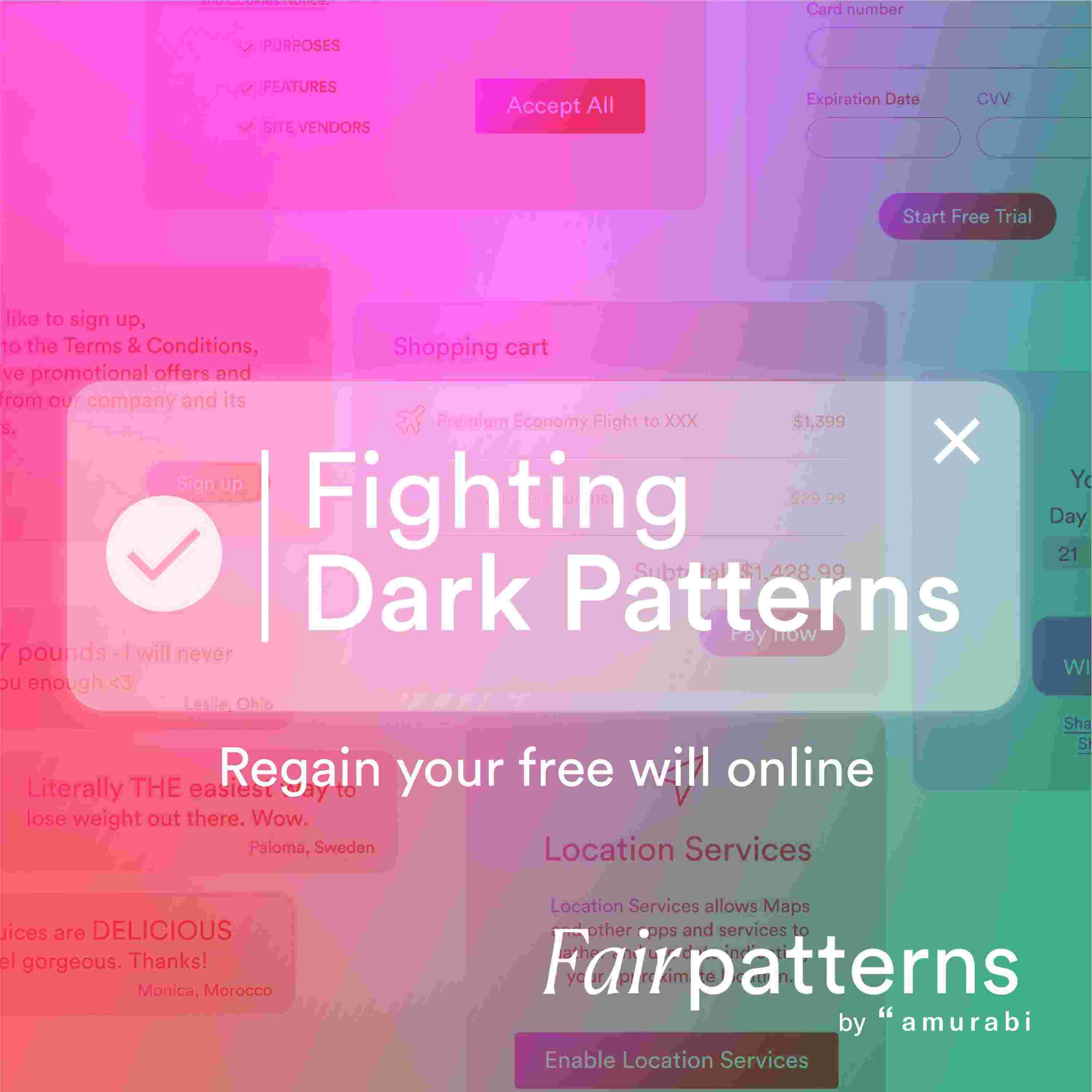
Have you ever struggled to resist sites or apps which prompt you to share ever more personal data? Who hasn’t casually clicked on the big green “I agree” button, instead of the little grey links below? And who doesn’t lose their patience unsubscribing from a website, when all it took was one click to “try for free”?
These features are called “dark patterns” or “deceptive patterns”, which are interfaces that deceive or manipulate users to make them act without realizing or against their own interests.
Why should we care about it ? Because …
✅ dark patterns harm the autonomy, the welfare and the privacy of individuals, and are psychologically detrimental
✅ a number of laws already prohibit dark patterns, and the global legislative framework is shifting towards clarity, transparency, accessibility and fairness by design
✅ dark patterns affect competition and trust in brands, and even puts our democratic models at risk
And because eventually, there is nothing sustainable about tricking users.
Dark patterns are pretty much everywhere online and yet, it’s not inevitable to be deceived or manipulated. With this podcast, once a month, Marie Potel, founder of the legal design agency Amurabi and of the platform fairpattern.com explore with her guests all the aspects of this dark and broad matter : regulation, ethics, marketing, user experience and much more.
A question or a need for support ? Go on fairpatterns.com or contact Marie Potel on LinkedIn !
This podcast is proposed and presented by Marie Potel, produced by Amicus Radio and directed by Leobardo Arango.
Original Music : Alexis Mallet.
Hébergé par Acast. Visitez acast.com/privacy pour plus d'informations.
Have you ever struggled to resist sites or apps which prompt you to share ever more personal data? Who hasn’t casually clicked on the big green “I agree” button, instead of the little grey links below? And who doesn’t lose their patience unsubscribing from a website, when all it took was one click to “try for free”?
These features are called “dark patterns” or “deceptive patterns”, which are interfaces that deceive or manipulate users to make them act without realizing or against their own interests.
Why should we care about it ? Because …
✅ dark patterns harm the autonomy, the welfare and the privacy of individuals, and are psychologically detrimental
✅ a number of laws already prohibit dark patterns, and the global legislative framework is shifting towards clarity, transparency, accessibility and fairness by design
✅ dark patterns affect competition and trust in brands, and even puts our democratic models at risk
And because eventually, there is nothing sustainable about tricking users.
Dark patterns are pretty much everywhere online and yet, it’s not inevitable to be deceived or manipulated. With this podcast, once a month, Marie Potel, founder of the legal design agency Amurabi and of the platform fairpattern.com explore with her guests all the aspects of this dark and broad matter : regulation, ethics, marketing, user experience and much more.
A question or a need for support ? Go on fairpatterns.com or contact Marie Potel on LinkedIn !
This podcast is proposed and presented by Marie Potel, produced by Amicus Radio and directed by Leobardo Arango.
Original Music : Alexis Mallet.
Hébergé par Acast. Visitez acast.com/privacy pour plus d'informations.

Traditional economics assumes that as humans, we use all available information, and we process all this information in a purely rational way in order to make an optimal decision. But studies show that in reality, there are serious limits to anyone's ability to process information. Behavioral economics calls these limits « bounded rationality ».
Because of these cognitive limitations, the way in which information or choices are presented can have a significant impact on the decisions that individuals make.
How behavioral economics can be used by policymakers to design “choice architectures” such that people are promoted to make better decisions? What can economics teach us about how dark patterns work? What are the incentives to switch from dark to fair patterns, from a sheer economic point of view?
In this episode, we dive into the economics behind dark patterns with Marie Potel and her guests, Anastasia Shchepetova and Lirio Barros, both consultants in economics and finance at Oxera.
To go further :
Have a question or need some support? Visit us at fairpatterns.com and follow us on LinkedIn FairPatterns!
Hébergé par Acast. Visitez acast.com/privacy pour plus d'informations.